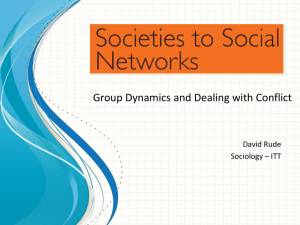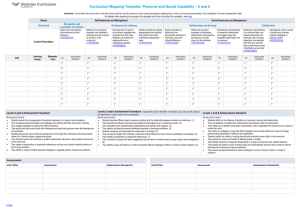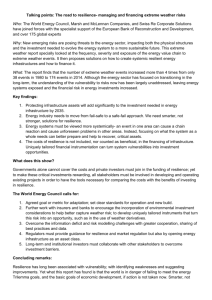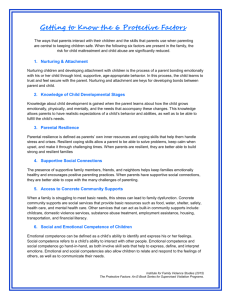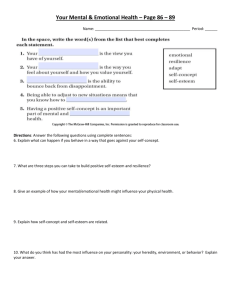Emotional Resilience
advertisement
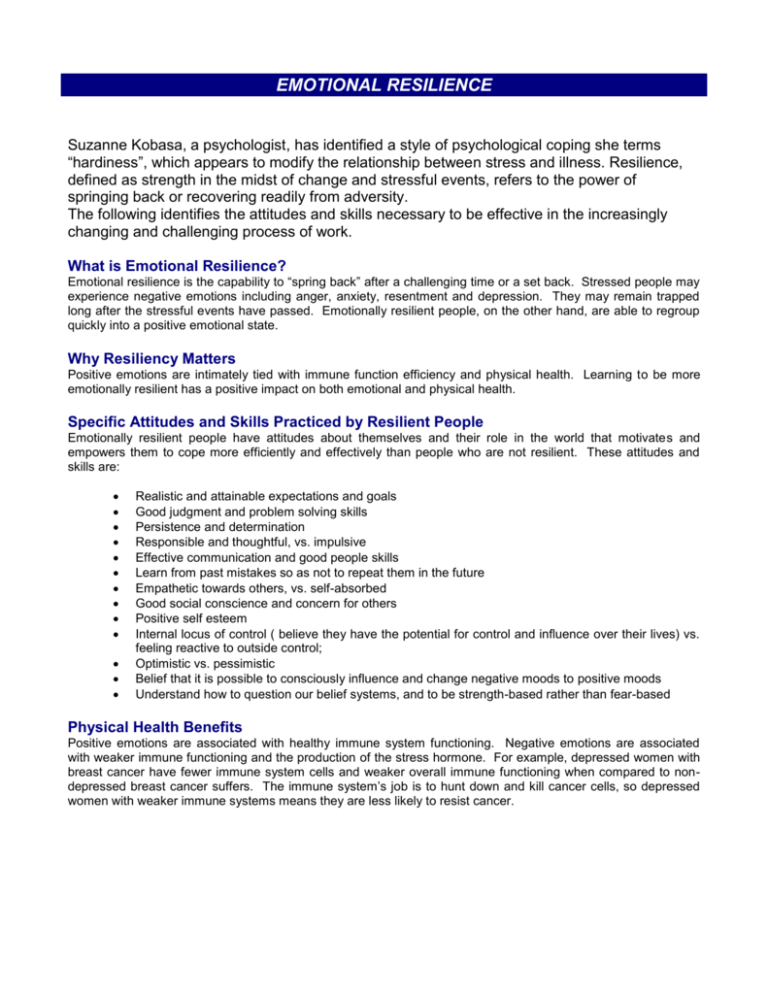
EMOTIONAL RESILIENCE Suzanne Kobasa, a psychologist, has identified a style of psychological coping she terms “hardiness”, which appears to modify the relationship between stress and illness. Resilience, defined as strength in the midst of change and stressful events, refers to the power of springing back or recovering readily from adversity. The following identifies the attitudes and skills necessary to be effective in the increasingly changing and challenging process of work. What is Emotional Resilience? Emotional resilience is the capability to “spring back” after a challenging time or a set back. Stressed people may experience negative emotions including anger, anxiety, resentment and depression. They may remain trapped long after the stressful events have passed. Emotionally resilient people, on the other hand, are able to regroup quickly into a positive emotional state. Why Resiliency Matters Positive emotions are intimately tied with immune function efficiency and physical health. Learning to be more emotionally resilient has a positive impact on both emotional and physical health. Specific Attitudes and Skills Practiced by Resilient People Emotionally resilient people have attitudes about themselves and their role in the world that motivates and empowers them to cope more efficiently and effectively than people who are not resilient. These attitudes and skills are: Realistic and attainable expectations and goals Good judgment and problem solving skills Persistence and determination Responsible and thoughtful, vs. impulsive Effective communication and good people skills Learn from past mistakes so as not to repeat them in the future Empathetic towards others, vs. self-absorbed Good social conscience and concern for others Positive self esteem Internal locus of control ( believe they have the potential for control and influence over their lives) vs. feeling reactive to outside control; Optimistic vs. pessimistic Belief that it is possible to consciously influence and change negative moods to positive moods Understand how to question our belief systems, and to be strength-based rather than fear-based Physical Health Benefits Positive emotions are associated with healthy immune system functioning. Negative emotions are associated with weaker immune functioning and the production of the stress hormone. For example, depressed women with breast cancer have fewer immune system cells and weaker overall immune functioning when compared to nondepressed breast cancer suffers. The immune system’s job is to hunt down and kill cancer cells, so depressed women with weaker immune systems means they are less likely to resist cancer. Emotional Intelligence Resilience is a learnable skill, and it requires work towards greater self-knowledge. Emotional intelligence is “your ability to use your emotions intelligently and appropriately in different situations, combined with your ability to use emotions to make yourself more intelligent overall. Emotionally intelligent people are able to; accurately recognize and comprehend emotion (both in others and in themselves), appropriately express and control their own emotions, help facilitate emotional, intellectual and spiritual growth. Emotionally intelligent people intentionally use their thinking and behavior to guide their emotions rather than letting their emotions dictate their thinking and behavior. People who are emotionally intelligent tend to be highly emotionally resilient. The seven primary emotional intelligence and resiliency skills are: 1. Self Awareness: the ability to recognize feelings while they are happening 2. Emotional Management: controlling feelings so that they remain appropriate to a given situation (maintaining perspective, calming skills, functioning from our strengths vs. our fears, identifying the difference between negative core beliefs and truth) 3. Self-Motivation: keeping actions goal-directed, even when distracted by emotion; ability to delay gratification and avoid impulsive acting out 4. Problem Solving 5. Conflict Resolution 6. Empathy: ability to notice and correctly interpret needs and wants of others 7. Relationship Management: ability to anticipate, understand and appropriately respond to the emotions of others Underlying Attitudes and Skills Emotional resilience is a matter of attitude and belief. How people think about themselves, their relationships with others, and the world around them forms the foundation for emotion management. Negative, defeatist attitudes towards self and others undercut resilience. Positive, empowering attitudes create the ideal foundation for resilience. Emotionally resilient people display the following characteristics: Happiness: good self esteem, confidence in self, firm belief in own competence Personal Control: belief that we have control over what happens to us; we are in charge of our own destiny rather than being a victim of others or bad luck Primary Control: ability to actually change a situation Secondary Control: ability to change how we think about a situation Optimism: hopeful, and a belief we may succeed when we try new things, seek new learning and value in challenging times; ability to change learned helplessness Practice mindfulness and have ability to “go with the flow” Hardiness: view stress as a challenge, identify personal control, demonstrate commitment Communication skills Healthy relationships Practice compassion and empathy To learn more about emotional resilience and other valuable mental health and wellness practices, please visit your EAS / Wellness Matters website at eas.psdschools.org or call EAS at 970-204-4718.
